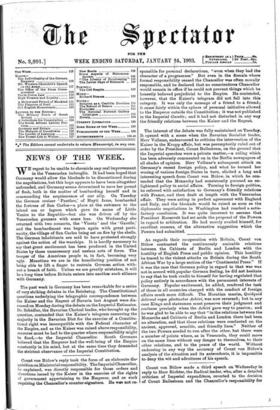As regards their co-operation with Britain, Count von Billow contrasted
the continuously amicable relations between the Cabinets of Berlin and London with the hostility of English Press and public opinion. This hostility he traced to the violent attacks on Britain during the South African War by a large section of the " Continental Press." If it was the case that German policy in regard to that war was not in accord with popular German feeling, he did not hesitate to say that he took credit to himself for having regulated that policy entirely in accordance with the permanent interests of Germany. Popular excitement, he added, rendered the task of those in all countries charged with the conduct of foreign affairs much more difficult. The Horatian maxim, Quidquid dclirant reges plectuntur Achivi, was now reversed; but in any case Kings and statesmen must preserve their judgment and coolness precisely when the Achivi gave way to passion; and he was glad to be able to say that "in the relations between the Monarchs and Cabinets of Berlin and London there had been no alteration, and that these relations were conducted on the ancient, approved, sensible, and friendly lines." Neither of the two Powers needed to run after the other, but there were a number of points where, as in Venezuela, they could move on the same lines without any danger to themselves, to their other relations, and to the peace of the world. Without endorsing in any way the accuracy of Count von Billow's analysis of the situation and its antecedents, it is impossible to deny the wit and adroitness of his speech.






































